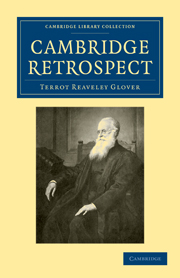Chapter V - Changes
Published online by Cambridge University Press: 07 September 2010
Summary
It was a quip of my Father's long ago that the authentic words of Adam to Eve as they left Paradise were: ‘My dear, we live in times of transition.’ It is nowadays, I believe, attributed to Dean Inge; perhaps he thinks he coined it; perhaps he did, for great sayings are repeated again and again. Aelius Donatus, the grammarian quoted by St Jerome, put the thing once and for all (and many others must have echoed it from their hearts): Pereant qui ante nos nostra dixerunt. Whoever spoke first about times of transition, the years since I first knew Cambridge deserve that description. Within my lifetime, a few years (as I would now reckon them) before I came into residence, the doors were opened to dissenters, freedom was given to Fellows of Colleges to marry, the taking of holy orders was no longer required. All these changes rested on definite enactments, Royal Commission, Parliament and so forth. There were other changes devised by the University itself, and carried out by ‘Graces’ of the Senate; and still a third type of change that came neither from Act of Parliament nor Grace of the Senate, but in response to changing habits in the country at large, changes in social ways, political ideas, standards of education, theological conceptions and the decay of sentiment for ‘organized religion’. Such things as the motor-car, cheaper and easier foreign travel, the gramophone, the wireless, modify our outlooks more than we suppose.
- Type
- Chapter
- Information
- Cambridge Retrospect , pp. 104 - 114Publisher: Cambridge University PressPrint publication year: 2009First published in: 1943



